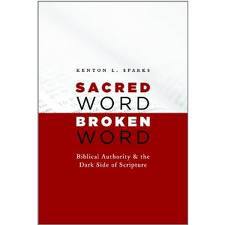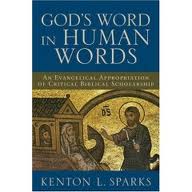 Three months ago, Eerdmans released Kent Sparks’s latest book, Sacred Word, Broken Word: Biblical Authority and the Dark Side of Scripture
Three months ago, Eerdmans released Kent Sparks’s latest book, Sacred Word, Broken Word: Biblical Authority and the Dark Side of Scripture. Many will remember the controversy generated by his 2008 publication, God’s Word in Human Words: An Evangelical Appropriation of Critical Biblical Scholarship
. In the latter, Sparks took to task many of his fellow Evangelical
 biblical scholars for failing to follow through with the implications of their academic training, preferring, rather, to defend Evangelical doctrinal boarders.
biblical scholars for failing to follow through with the implications of their academic training, preferring, rather, to defend Evangelical doctrinal boarders.
Not everyone was thrilled to be called out, and Sparks received some hard hitting reviews, as well as an entire publication attempting to show how wrong his assessment of Evangelical biblical scholarship is (Do Historical Matters Matter to Faith?: A Critical Appraisal of Modern and Postmodern Approaches to Scripture).
This is not the place to rate the success of that response (which I think is minimal), but I do think that both critics and fans of Sparks’s brand of Evangelical biblical scholarship would do well to read carefully his most recent publication. In God’s Word in Human Words, Sparks clearly has an ax to grind–that is the whole point of the book. But no axes are being ground in Sacred Word, Broken Word.
This is a positive declaration of how to read Scripture, which will prove entirely controversial for those concerned to protect the Evangelical system, and likewise welcomed by those who do not share that concern. Both groups will benefit from seeing what Sparks thinks when not in attack mode (which may also temper some criticisms of God’s Word in Human Words).
I am currently twisting Sparks’s arm to get him to write a few blog posts here outlining the main reasons why he feels Sacred Word, Broken Word is worth reading. Thus far he has ignored my faxes, emails, texts, and bonded couriers, but, in anticipation of that glorious day, I’d like offer a trailer or two, a bow to the summer movie season, as it were.
Sparks starts right off with a quote from German theologian Dietrich Bonhoeffer:
We must read this book of books with all human methods. But through the fragile and broken Bible, God meets us in the voice of the Risen One.
And some of you thought all Bonheoffer did was plot to kill Hitler.
This somewhat paradoxical quote sums up nicely what Sparks is about when he thinks of what Scripture is and, therefore, what it means to read it well. Scripture is “broken and fragile,” which can be easily discerned by reading Scripture with “all human methods” (yes, that means historical criticism). Yet, at the same time, such a Scripture is the “book of books” through which we hear the “voice of the Risen One.”
For Sparks, embracing such a paradox is not an exercise in deconstructing the Bible, but coming to terms with its undeniable properties. He guides his readers in accepting inevitability of the paradox, and the positive, spiritually nurturing, implications of doing so.
If you get this main point, you’ll get Spark’s book–which is written in an accessible, readable style, suitable for experts and non-experts alike.
In a few upcoming posts, I will touch down at various points in the book with some quotes that I think will help readers see where Sparks is coming from.
